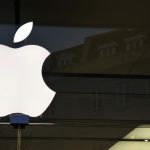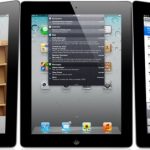iPhone generates more revenue than all Microsoft

In case you missed it, and I certainly would have if not for someone asking a question, Apple's fiscal 2012 first quarter earnings report has a jaw dropper. iPhone generated $24.42 billion revenue. During the same quarter, all of Microsoft: $20.89 billion. More broadly, Apple revenue ($46.33 billion) was more than twice Microsoft's, and net income nearly was ($13.06 billion versus $6.62 billion, respectively). But it's that iPhone figure that really stands out. One product's revenues against an entire company's. Microsoft's margins are better, but who wouldn't want more money in the bank?
Nearly five years ago, Microsoft CEO Steve Ballmer dismissed iPhone, in a USA Today interview: "There's no chance that the iPhone is going to get any significant market share. No chance. It's a $500 subsidized item. They may make a lot of money. But if you actually take a look at the 1.3 billion phones that get sold, I'd prefer to have our software in 60 percent or 70 percent or 80 percent of them, than I would to have 2 percent or 3 percent, which is what Apple might get". How's that for the mother of wrong predictions?
Apple Q1 2012 by the numbers: $13B profit, 37M iPhones sold

Today, after the closing bell, Apple answered the question analysts have asked for weeks: How many iPhones sold during the holiday quarter? The answer: A colossal number -- 37.04 million.
Apple also shipped 5.2 million Macs and 15.43 million iPads during fiscal 2012 first quarter. Analyst consensus was around 5 million and 14 million, respectively, and 32.5 million iPhones. During today's earnings conference call, Apple CFO Peter Oppenheimer revealed 315 million cumulative iOS device sales. Apple's App Store has 550,000 applications -- 150,000 for iPad. Developers will have earned $4 billion cumulatively by the end of the month, he said.
Don't cry for me Las Vegas, Microsoft cancels MIX!

In December, Microsoft pulled out of the Consumer Electronics Show starting with next year's event. The rationale: Smaller, Microsoft events are more beneficial to everyone -- the company, attendees and customers for starters. Hey, that makes sense to me. So then, why is the software giant suddenly pulling one of its most-important developer events of the year? Without fanfare, or even a proper burial, MIX is over. Not just MIX 2012, but the entire event. Poof! Gone! Outta here!
Tim O’Brien, Developer & Platform Evangelism general manager, broke the news on the Official Microsoft Blog early this afternoon. Considering how hot and heavy Microsoft is about the Cloud right now and release this year of Internet Explorer 10 and Windows 8, timeing sure seems strange.
iPhone represents more than half of Verizon smartphone sales

This morning before the opening bell, Verizon Wireless announced fourth-quarter results. The carrier sold 7.7 million smartphones. Earlier this month, the nation's largest carrier disclosed 4.2 million iPhone activations during the same time period. Divide it up, and iPhone accounted for 54.5 percent of Verizon smartphone sales. (Update: Revised 4.3 million number released today puts it at 55.8 percent.) By comparison, Verizon sold 2.3 million 4G LTE devices, which includes mobile hotspots and tablets. At best, LTE devices accounted for 30 percent of smartphone sales. However, since that number includes other devices, iPhone outsold LTE smartphones by about 2 to 1.
In September I asked: "What if there is no iPhone 5 LTE?", before Apple announced 4S instead. Today, Verizon answered that question. As of Monday, the nation's largest 4G network reached 200 million in 195 US markets. Verizon currently offers 20 LTE devices, 10 of them smartphones -- 11, if counting 16GB and 32GB Droid Razrs. How much does LTE matter? Clearly not enough.
'This is our generation's Woodstock'

Samsung's newest "The Next Big Thing is Already Here" TV commercial is the riskiest, but by far the snarkiest for anyone closely following the marketing campaign. The jokes are all inside and require some familiarity with previous installments. The risk: Everyone else won't get it. The snark: The iPhone hipster putdowns are mean -- really mean.
During the very first commercial, one Apple hipster waiting in line for iPhone could never get a Samsung because he's "creative". The guy next to him snipes: "Dude, you're a barista". Both men are back in the new commercial, with the barista serving coffee to the snarky companion -- who is carrying Galaxy S II! He's done with the iPhone hipset and makes it known: "It's nice latte art, my man. I see you're still creative". He's with a woman who had the same Samsung smartphone during the first commercial in the series. The Barista: "You two look happy, with your phone".
Google+ names policy goes just far enough

There are lots of places where you can be anonymous online. Google+ isn't one of them. Late today, Google announced a revision to the G+ names policy that doesn't change this, but it does allow people to use nicknames and established pseudonyms. If anonymity is your thing, go somewhere else. I don't want you on Google+. You can bully pulpit somewhere else. As for those folks whose lives might be at risk for using real names, please be safe someplace else -- Facebook, Reddit, Twitter, Tumblr or WordPress, for example. Those services have proven they can protect your identity.
But, of course, the griping will continue from the Internet rabble determined to hide their identities everywhere. They want more from Google than just nicknames. What are you afraid of? I use my real name everywhere, as I have always done. I see that as being in the very spirit of the open -- and transparent -- Internet. Be who you are, not someone else. And if that comment --- or other online interaction -- requires you to hide your identity, shut the frak up. Vent somewhere else. For everyone else, and this includes people who have built up alternative identities, Google+ welcomes you.
One in four Americans own an e-book reader or tablet

That's a dramatic change from just a few months ago and, perhaps not coincidentally, before new Nooks and Kindles lowered price of entry for both categories. Between December and January, the number of Americans owning one of the devices rose to 29 percent from 18 percent. During the same time period, the number owning a tablet rose to 19 percent from 10 percent, which is the same rise for e-book readers.
Pew Internet released the data earlier today, based on surveys conducted in mid December and early January. "These findings are striking because they come after a period from mid-2011 into the autumn in which there was not much change in the ownership of tablets and e-book readers", according to the report. "However, as the holiday gift-giving season approached, the marketplace for both devices dramatically shifted". As recently as August 9 percent of Americans owned e-book readers and 10 percent tablets.
RIM's co-CEOs are out, Thorsten Heins is new chief executive

The phrase two heads are better than one didn't prove true for Research in Motion, which late today pushed aside its co-CEOs and replaced them with a single chief executive. It's a major shakeup that analysts called for more than a year ago. Out: Mike Lazaridis and Jim Balsillie. In: Thorsten Heins, who assumes his new responsibilities starting tomorrow. RIM has scheduled an 8 am ET conference call.
The question: Will the new leadership be a head-and-a-half? Lazaridis will serve as Vice Chair and lead RIM board's new Innovation Committee, working closely with Heins. Innovation was something surely missing from the BlackBerry maker under Lazaridis' co-leadership. Balsillie isn't completely out, as he will serve on RIM's board.
Apple's iBooks Author EULA is more and less evil than you think

There's a strange concept in marketing that no publicity is really bad. If people talk about you, it broadly raises brand awareness. People eventually forget the bad news but not the brand. Who remembers last year's furor over Apple's onerous publisher subscription terms? That's the eventual outcome from Apple's iBooks Author end-user license agreement, which has shocked many. Simply stated: If you publish ebooks using iBooks Author, no other publisher but Apple can profit. Distribution anywhere else must be for free. The Internet is outraged, even Apple apologists.
For all the negative outpouring -- and there is plenty -- Apple's EULA isn't as outrageous as critics claim -- it's more and less. The licensing agreement enforces Apple proprietary e-publishing file formats. On the less side, Apple's approach isn't far removed from what print publishers do today, and US copyright law likely supersedes Apple's EULA (but not necessarily any separate agreement).
'We just got Samsunged'

Since buying Galaxy Nexus last month, I haven't paid as much attention to Samsung's stunningly clever "The Next Big Thing is Already Here" advertising campaign that slaps around the iPhone hipster set. There's a new TV commercial that begins with a group of iPhone want-to-haves camped out, literally, by an Apple Store.
"Ah that looks like last year's phone" is the killer line, says a guy rising from his sleeping bag to look at an unboxing video of, presumably, iPhone 4S. Samsung snark already has soured perceptions of iPhone and boosted those of Samsung brands, according to YouGov BrandIndex. The attack ads, which never specifically mention iPhone, marks one of the most iconic marketing campaigns since Apple's "Get a Mac".
Investors punish Google for weak ad revenues

Google shares took a beating overnight, following fourth-quarter's earnings report. The information and search giant was down 7.7 percent in pre-market trading -- $49.25 to $590.32. Still, that's an improvement. Yesterday, Google closed at $639.57, and shares fell more than 10 percent during after-market trading. Google opened at $590.90 this morning and fell to $588.03 within the first 30 minutes of trading -- that's $51.54 off yesterday's close. By 10:17 am ET, Google shares closed on their pre-market decrease -- 7.78 percent, or down $49.77 per share.
Google's problem is one more of expectation than performance. Wall Street expected strong ad revenues for the holiday quarter, particularly with increase in online sales and therefore supporting search-related advertising. But ad prices fell instead, overshadowing other metrics. While paid clicks rose 34 percent, the amount paid for them fell by 8 percent, contributing to Google missing Wall Street consensus -- that despite solid revenue and earnings growth.
Anonymous launches SOPA strike, takes down Justice Dept.

"The Site is under maintenance. Please expect it to be back shortly". That's the message I found at Universal Music moments ago. The US Justice Department site isn't accessible at all. You can thank hacktavist group Anonymous, which claims responsibility for these and other SOPA blackouts today in response to the Feds shutting down Megaupload.
There's a certain irony to this evening's attacks. Yesterday, tens of thousands of sites supported a voluntary blackout protesting two bills snaking through Congress -- Stop Online Piracy (SOPA) and PIPA (PROTECT IP Act). Anonymous' attacks, presumably denial-of-service, blacked out sites that either support the legislation or would be responsible for enforcing it. We've gone from voluntary blackout protests yesterday to involuntary ones today. As I write, Recording Industry Association of America is down, too.
Microsoft Q2 2012 by the numbers: Windows revenue falls 6%

Late this afternoon, Microsoft answered a question oft-asked by investors this month: What about Windows? Near the end of his Consumer Electronics Show keynote last week, Microsoft CEO Steve Ballmer boomed: "There's nothing more important at Microsoft than Windows". But at the same event, Tami Reller, Windows & Windows Live CFO, warned that the division's fourth-quarter results could fall below analysts' estimates, because of weak PC sales. Today's fiscal second quarter 2012 earnings results answered by just how much.
For Q2, ended December 31, Microsoft revenue was $20.89 billion, up 5 percent year over year. Operating income: $7.99 billion, a 2 percent decrease. Net income was $6.62 billion, or 78 cents a share. Both were flat year over year.
It's not because of iPhone 4S

That's again my reaction to startling US mobile numbers that Nielsen released today. Like comScore, Nielsen shows dramatic -- and I mean absolutely stunning -- changes in Android and iPhone adoption since the 4S shipped. Android share, as measured in smartphone operating systems among new purchasers, plummeted from 61.6 percent in October to 46.9 percent in December. Meanwhile, iPhone rose from 25.1 percent share to 44.5 percent. Distribution -- not release of iPhone 4S -- is reason, or so I say.
Nielsen, naturally sees something else: "The high-profile launch of Apple’s iPhone 4S in the Fall had an enormous impact on the proportion of smartphone owners who chose an Apple iPhone" -- that would be for November and December. But that simplistic analysis overlooks mitigating factors. Among the most important -- 43 percent of new buyers chose older iPhones 4 or 3GS.
iPad invades the enterprise

Last week I chimed: "Only Windows 8 can save the PC market now". Weak consumer computer sales forebode market shifts ahead, but so do those in the enterprise. An IDG Connect study reveals just how much: IT and business decision makers are augmenting or replacing PCs with iPads at an alarming rate.
"Fully 51 percent of IT and business decision-makers say they always use their iPad at work", according to the report -- and, of course, that's the number who actually own the tablet. Sixteen percent have replaced their laptop with an iPad and 54 percent supplement it. Remember, these numbers are for people responsible for corporate computing. As the wind shifts in their sails -- or should that be sales -- so does it eventually across the computing infrastructure. The data suggests that iPads are significantly starting to cannibalize PC sales -- and not just among consumers -- and it's consistent with recent global PC buying trends.
Joe's Bio
Joe Wilcox is BetaNews executive editor. His motto: Change the rules. Joe is a former CNET News staff writer, JupiterResearch senior analyst, and Ziff Davis Enterprise Microsoft Watch editor.
Ethics StatementBetaNews, your source for breaking tech news, reviews, and in-depth reporting since 1998.
© 1998-2025 BetaNews, Inc. All Rights Reserved. About Us - Privacy Policy - Cookie Policy - Sitemap.
